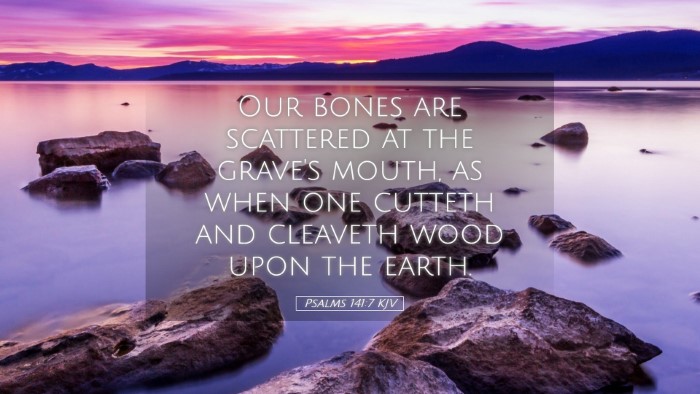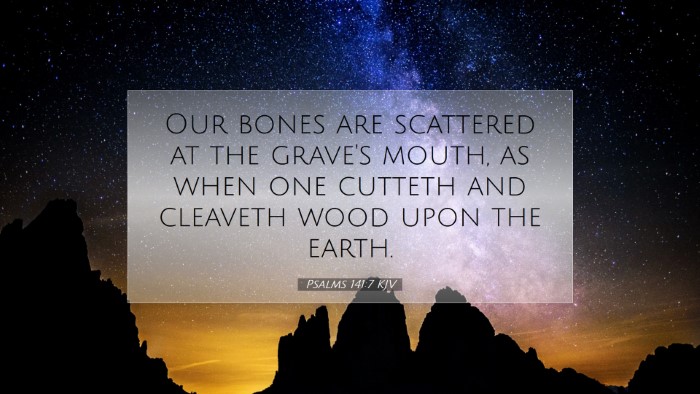Commentary on Psalms 141:7
Psalms 141:7: “Our bones are scattered at the grave’s mouth, as when one cutteth and cleaveth wood upon the earth.”
Introduction
This verse is part of a prayer of David, expressing deep anguish and a plea for divine assistance in the face of opposition. The imagery within this verse serves to illustrate the starkness of death and the precariousness of life, making it a poignant meditation for both personal reflection and communal worship.
Contextual Understanding
Understanding the context of Psalms 141 is crucial. This psalm is categorized as a lament, where David seeks God’s help amid the threats posed by the wicked. David urges God to accept his prayers and to guard his heart from sin. The surrounding passages resonate with themes of protection, vulnerability, and the earnest cry for deliverance.
Analysis of the Imagery
The imagery of “bones scattered at the grave’s mouth” invokes a powerful sense of despair and hopelessness. Matthew Henry posits that it reflects a state of being utterly forsaken, where David feels like a scattered remnant, akin to fallen timber without purpose. This stark visualization harkens to the finality of death, where bones symbolize the remnants of life and the inevitable return to the dust.
Albert Barnes offers a perspective that emphasizes the completeness of destruction implied in the phrasing. The act of cutting and cleaving wood suggests a violent and thorough process, further underscoring the dread David feels against his adversaries. It conveys the severity of the situation, where his enemies threaten to completely obliterate his sense of being and purpose.
Adam Clarke takes this imagery further, comparing it to the practices involved in funeral rites and the utter disintegration associated with death. He interprets the verse as a metaphor for the defeat of the soul when faced with the grave's approach. This evokes a sentiment of the fragility of life and the overwhelming nature of suffering that accompanies it.
Theological Insights
The theological implications of this verse are profound. It reveals the human condition's fragility and the universal experience of suffering and death. David's lament can be seen as representative of humanity's cries throughout the ages, reflecting a deep yearning for restoration and hope. The psalmist’s despair does not diminish God's sovereignty; rather, it underscores dependence on divine mercy during tumultuous times.
Moreover, the verse serves as a point of reflection on the nature of sin and its consequences. David’s fear of falling into iniquity amidst the wicked highlights the spiritual warfare believers endure. The bones scattered symbolize the disintegration caused by sin not just physically but also spiritually, leading to death in the relational sense with God.
Practical Applications
For pastors and theologians, Psalms 141:7 can serve as a pinnacle in lessons on lament. It encourages an understanding that believers are not alone in their struggles and that expressing sorrow is an act of faith. The psalm invites congregations to articulate their anguish before God, representing vulnerability that leads to genuine dependence on divine intervention.
- Encouragement During Trials: The imagery of being scattered reflects the feelings individuals might encounter when facing life’s hardships. Preaching from this passage can provide comfort, assuring the faithful that God hears their prayers in times of despair.
- Understanding Sin's Destructive Effects: The commentary encourages awareness of how sin can devastate one’s life and relationships. It invites discussions on repentance and the call to a holy life.
- Lament as Worship: Integrating laments in worship fosters a communal understanding of suffering and encourages the faithful to turn to God, reinforcing corporate identity in faith.
Conclusion
Psalms 141:7 serves as a stark reminder of the tension between despair and hope. While it communicates the severity of life’s struggles and the potential for complete separation, it simultaneously calls believers to petition God for grace and restoration. The insights from cherished public domain commentaries enhance the understanding of this verse, allowing it to resonate deeply with those who seek to live faithfully in the face of adversity.


